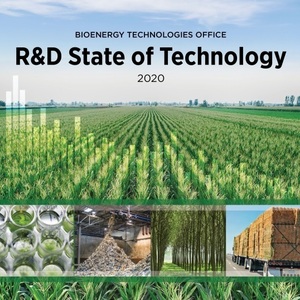DOE BETO releases 2020 R&D State of Technology report

June 6, 2022
BY Erin Voegele
The U.S. Department of Energy’s Bioenergy Technologies Office (BETO) in May released its “BETO 2020 R&D State of Technology” report, which provides a status of research and development efforts and assesses progress made toward BETO goals.
BETO funds research and development of technologies necessary for the deployment and production of cost-competitive bioenergy, primarily biofuels. The agency periodically compiles and compares the results of experimental efforts with benchmark technology designs to assess progress made toward BETO goals. The latest such report provides a status of those research and development efforts at the end of 2020 and discusses technical challenges and barriers facing the industry.
The report discusses seven specific technology pathways, including four for dry feedstocks and three for wet feedstocks. Two pathways are included under a category focused on dry feedstocks converted via higher temperatures and upgrading, including direct liquefaction and upgrading (catalytic fast pyrolysis) and indirect liquefaction and upgrading. Two other pathways focus on dry feedstocks converted via low temperature upgrading, including the biochemical conversion via 2,3 butanediol (BDO) intermediate and biochemical conversion via mixed-acids intermediate. Two pathways are also addressed under the category of wet feedstocks converted via high temperature upgrading, including algal hydrothermal liquefaction and wet waste hydrothermal liquefaction. A single pathway is addressed under the category for wet feedstocks converted via low temperature and upgrading. That pathway focuses on combined algae processing via 2,3 BDO or carboxylic acid intermediate.
A full copy of the 168-page report can be downloaded from the BETO website.
Advertisement
Advertisement
Related Stories
Biomass Magazine has announced the dates for the 19th annual International Biomass Conference & Expo. The event is scheduled to be held March 31-April 2, 2026, in Nashville, Tennessee, at the Gaylord Opryland Resort & Convention Center.
Industry experts weigh in on the status of Canada’s renewable fuels industry and the impact of government policy and regulation.
Iowa state lawmakers in May approved tax legislation that, in part, aims to create a tax credit to incentivize sustainable aviation fuel (SAF) production within the state. The bill is now under consideration by Iowa Gov. Kim Reynolds.
The Congressional Biofuels Caucus on May 22 launched for the 119th Congress. Caucus members recognize that biofuels are key to American energy independence and advocate for policies that support biofuel producers.
With exclusive licensing to a camelina seed variety, Ash Creek Renewables is breaking down barriers to a renewable future.
Upcoming Events










